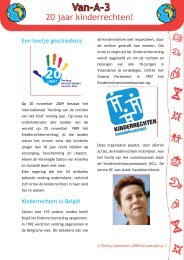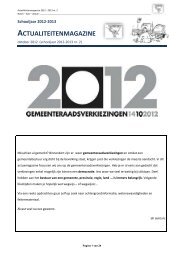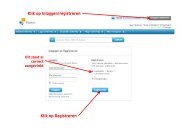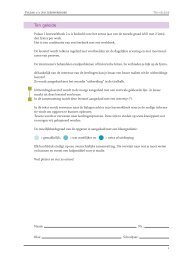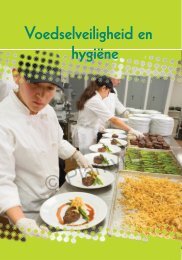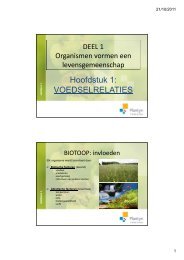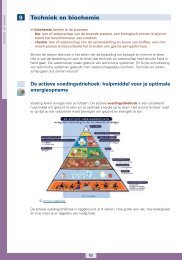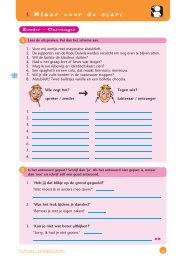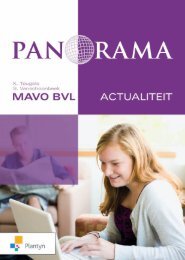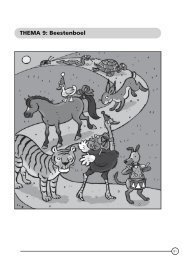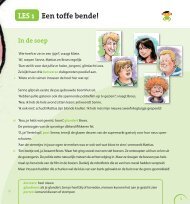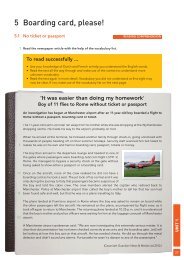Met de nieuwe Contact 5 is de vernieuwing compleet! - Plantyn
Met de nieuwe Contact 5 is de vernieuwing compleet! - Plantyn
Met de nieuwe Contact 5 is de vernieuwing compleet! - Plantyn
Create successful ePaper yourself
Turn your PDF publications into a flip-book with our unique Google optimized e-Paper software.
<strong>Met</strong> <strong>de</strong> <strong>nieuwe</strong> <strong>Contact</strong> 5 <strong>is</strong><br />
<strong>de</strong> <strong>vernieuwing</strong> <strong>compleet</strong>!
ordboek<br />
De <strong>nieuwe</strong> ContaCt 5 <strong>is</strong> er!<br />
Zoals aangekondigd zijn <strong>Contact</strong> 5 leerboek en werkboek grondig vernieuwd. In navolging<br />
van <strong>Contact</strong> 4 hebben verschillen<strong>de</strong> <strong>vernieuwing</strong>en plaatsgevon<strong>de</strong>n. Zo snijdt <strong>de</strong> vernieuw<strong>de</strong><br />
<strong>Contact</strong> 5 verschillen<strong>de</strong> thema’s aan om zowel klassikaal te behan<strong>de</strong>len on<strong>de</strong>r leiding van <strong>de</strong><br />
leerkracht als via persoonlijk werk in kleine groepen uit te diepen. Daarnaast maakt ook<br />
literatuur een belangrijk <strong>de</strong>el uit van <strong>de</strong> <strong>nieuwe</strong> <strong>Contact</strong> 5. Ten slotte wordt extra aandacht<br />
besteed aan language learning met uitbreidingen voor <strong>de</strong> ver<strong>de</strong>re exploratie van grammaticale<br />
items, naast oefeningen voor remediëring.<br />
Voor De leerling<br />
Tekstboek<br />
Werkboek<br />
Extra online materiaal via www.knooppunt.net zoals dialogen, lu<strong>is</strong>teroefeningen en songs<br />
Voor De leerkraCht<br />
Handleiding (incl. online ICT en dvd) met jaarplan, eindtermen, ingevuld werkboek,<br />
woor<strong>de</strong>nlijsten, suggesties voor toetsen en evaluaties ...<br />
Audio-cd met alle lu<strong>is</strong>termateriaal (ook voor toetsen)<br />
Bordboek als digitale versie van tekstboek en werkboek met oplossingen en geluidsfragmenten<br />
Online lerarenkit met handleiding via knooppunt en bordboek
persoonlijk werk<br />
De vernieuw<strong>de</strong> <strong>Contact</strong> 5 gaat resoluut ver<strong>de</strong>r met het creëren van mogelijkhe<strong>de</strong>n<br />
voor persoonlijk werk, waarmee in <strong>Contact</strong> 4 <strong>is</strong> gestart.<br />
Do you speak Engl<strong>is</strong>h?<br />
How to learn a foreign language (I)<br />
1 Answer the questionnaire in your workbook. Work individually fi rst.<br />
WB ex. 1.1<br />
Submit your self-assessment to a<br />
partner’s opinion about you, if you want.<br />
(Exchange workbooks for that and talk<br />
about it for a few minutes.)<br />
2 Think about your experiences with the<br />
learning of foreign languages.<br />
Were your efforts successful?<br />
unit 1<br />
– if so, what would be reasons for<br />
your success?<br />
– if not, what may have gone wrong?<br />
Take notes in your workbook.<br />
WB ex. 1.2<br />
3 D<strong>is</strong>cuss your experiences with classmates. One stu<strong>de</strong>nt of your team takes notes.<br />
WB ex. 1.3<br />
4 Here <strong>is</strong> some information on how to learn foreign languages and on the importance of motivation in<br />
that respect. Read it.<br />
unit<br />
1<br />
CONT50L.indb 9 21-04-11 13:27<br />
Uit: <strong>Contact</strong> 5 Textbook<br />
In het begin van elke unit wor<strong>de</strong>n <strong>de</strong><br />
leerlingen aangezet om eerst individueel<br />
enkele vragen te beantwoor<strong>de</strong>n.<br />
Elke unit bevat telkens vijf topics met projecten waarrond<br />
individueel of in groepen kan wor<strong>de</strong>n gewerkt. Een<br />
takenblad per topic helpt hen aan <strong>de</strong> slag te gaan. De<br />
thema’s kunnen telkens ver<strong>de</strong>r wor<strong>de</strong>n geëxploreerd en<br />
gepresenteerd in <strong>de</strong> klas. Deze opdrachten laten uiteraard<br />
ook een meer klassikale behan<strong>de</strong>ling toe. De woor<strong>de</strong>nschat<br />
wordt ook per on<strong>de</strong>r<strong>de</strong>el aangebo<strong>de</strong>n in het<br />
werkboek. Hierdoor kan <strong>de</strong> leerkracht zelf bepalen welke<br />
on<strong>de</strong>r<strong>de</strong>len behan<strong>de</strong>ld wor<strong>de</strong>n.<br />
9<br />
Objectives<br />
unit 1<br />
The fi rst unit offers information about various aspects concerning languages. Th<strong>is</strong> information allows further<br />
refl ection and investigation.<br />
It can be studied in two ways.<br />
1 You can read and d<strong>is</strong>cuss the information in class gui<strong>de</strong>d by your teacher.<br />
Th<strong>is</strong> will result in:<br />
- mastery of new vocabulary related to th<strong>is</strong> topic<br />
- information on languages <strong>de</strong>pending on the materials studied in class<br />
- reading and l<strong>is</strong>tening comprehension practice<br />
- speaking and writing practice<br />
2 You can be asked to study and explore the topic in<strong>de</strong>pen<strong>de</strong>ntly in small groups.<br />
If the in<strong>de</strong>pen<strong>de</strong>nt learning option <strong>is</strong> taken, the class <strong>is</strong> divi<strong>de</strong>d into fi ve subgroups, of which the number<br />
of participants <strong>de</strong>pends on the number of stu<strong>de</strong>nts in your class (e.g. a class of 20 stu<strong>de</strong>nts results in<br />
groups of 4 stu<strong>de</strong>nts each).<br />
Each group studies one of the topics.<br />
Th<strong>is</strong> procedure will result in a presentation for the classmates. Not every member of the group needs to<br />
do part of the presentation of a particular topic, but every member of the team must help to prepare<br />
the presentation the team has been working on.<br />
However, in the course of the term or the school year every stu<strong>de</strong>nt of the class must have done a<br />
presentation on one topic or the other.<br />
Personal investigation practice<br />
If you <strong>de</strong>ci<strong>de</strong> to explore one of the topics further individually, or in pairs, you will have to take a number<br />
of steps.<br />
- Ask yourself a number of questions to which you want to fi nd the answers.<br />
- Look for and study information in books, magazines, the Internet, interviews, ...<br />
- Select relevant information.<br />
- Summarize th<strong>is</strong> information in your own words as answers to your original questions.<br />
- Prepare an oral presentation for your classmates, including a PowerPoint presentation, if appropriate.<br />
- Do the presentation.<br />
- Answer questions asked by your classmates or the teacher or d<strong>is</strong>cuss opinions put forward by classmates or<br />
the teacher.<br />
Uit: <strong>Contact</strong> 5 Workbook<br />
unit<br />
1<br />
32<br />
unit<br />
1<br />
In elke unit bevatten <strong>de</strong> Objectives een<br />
dui<strong>de</strong>lijk stappenplan om leerlingen bij<br />
hun persoonlijk werk te begelei<strong>de</strong>n.<br />
Unit 1 Topic 1 How to learn foreign languages<br />
1 Read the task as <strong>de</strong>scribed on TB p. xx and do WB ex. 1.1 individually. Then exchange your<br />
workbook with a partner’s and tell him / her if you think their self-assessment <strong>is</strong> fair. (You can<br />
also skip th<strong>is</strong> step, if you think your partner doesn’t know you well enough.)<br />
2 Do WB ex 1.2 individually.<br />
3 D<strong>is</strong>cuss the topic with your team. One team member concentrates on what <strong>is</strong> being said, rather<br />
than taking part in the d<strong>is</strong>cussion and takes notes (WB ex. 1.3). These notes will be used in the<br />
presentation.<br />
4 Read the pieces of advice and the notes on motivation in your TB p. xx and apply them to yourself.<br />
(WB ex. 1.4.1)<br />
5 L<strong>is</strong>ten to the speaker and summarize h<strong>is</strong> or her talk (WB ex. 1.4.2).<br />
6 Exchange experiences and views with the other members of your team. One member of the<br />
team takes notes (WB ex. 1.4). These notes will be used in the presentation.<br />
7 Prepare the presentation with your team. Touch the following aspects:<br />
- the result of your self-assessment activity and that of your team members<br />
- the pieces of advice and the motives for studying foreign languages<br />
- the pieces of advice and the motives most prominent in your team<br />
8 Deci<strong>de</strong> who of your teammates will take part in the presentation and give it.<br />
9 Answer questions and d<strong>is</strong>cuss opinions.<br />
Unit 1 Topic 2 Why Engl<strong>is</strong>h?<br />
1 Read the introductory information in your textbook p. xx and do WB ex. 1.5.1.<br />
2 D<strong>is</strong>cuss your results with those of your teammates (WB ex. 1.5.2).<br />
3 Read the article A Global Language and compare the content with your own opinions. Exchange<br />
views on the topic with your teammates (WB ex. 1.5.3).<br />
4 Do the vocabulary exerc<strong>is</strong>e WB ex. 1.6. Th<strong>is</strong> vocabulary will come in useful during your presentation.<br />
5 Reread David Crystal’s article and answer the questions of WB ex. 1.7.1.<br />
6 Give your opinion on the question asked in WB ex. 1.7.2. D<strong>is</strong>cuss the matter with your teammates.<br />
One team member takes notes on the result. These notes can be used during your<br />
presentation.<br />
7 Do the internet task <strong>de</strong>scribed in your TB p. xx and draw conclusions about the value of translating<br />
machines.<br />
8 Prepare the presentation with your team. Touch the following aspects.<br />
- the terms explained in WB ex. 1.66<br />
- the content of Prof. David Crystal’s article<br />
- the result of your Internet activity with Babel F<strong>is</strong>h<br />
- Your opinion on what you think will have happened in 50 years from now.<br />
Uit: <strong>Contact</strong> 5 Workbook<br />
Binnen elke unit komen telkens verschillen<strong>de</strong><br />
topics aan bod, waarbij persoonlijk werk een<br />
belangrijke rol speelt.<br />
31
literatuur<br />
In <strong>de</strong> <strong>nieuwe</strong> <strong>Contact</strong> 5 zijn unit 6 en unit 7 helemaal gewijd aan literatuur: leerlingen moeten leren genieten van literatuur,<br />
via persoonlijk studiewerk én <strong>de</strong> enthousiaste inbreng van <strong>de</strong> leerkracht. Ook een vergelijking van film en boek kan boeiend<br />
zijn, daarom <strong>is</strong> een uitgebrei<strong>de</strong> lijst met filmtitels opgenomen.<br />
unit<br />
unit<br />
6<br />
Unit 6 begint met een beknopt overzicht van <strong>de</strong><br />
geschie<strong>de</strong>n<strong>is</strong> van <strong>de</strong> Engelse literatuur.<br />
De leerkracht heeft <strong>de</strong> vrijheid om te besl<strong>is</strong>sen in<br />
hoever <strong>de</strong> inhoud van die literatuurgeschie<strong>de</strong>n<strong>is</strong> ‘te<br />
kennen’ <strong>is</strong> door <strong>de</strong> leerlingen. Daarnaast besteedt<br />
<strong>de</strong>ze unit uitgebreid aandacht aan verschillen<strong>de</strong><br />
karakter<strong>is</strong>tieke werken.<br />
OLIVER TWIST<br />
First read the introductory information on Charles Dickens in A Conc<strong>is</strong>e H<strong>is</strong>tory of Engl<strong>is</strong>h Literature<br />
up to the 20th Century. Then read the additional information in the text below.<br />
OLIVER TWIST<br />
First read the introductory information on Charles Dickens in A Conc<strong>is</strong>e H<strong>is</strong>tory of Engl<strong>is</strong>h Literature<br />
up to the 20th Oliver Tw<strong>is</strong>t was fi rst publ<strong>is</strong>hed in monthly parts in a magazine called Bentley’s M<strong>is</strong>cellany. It began<br />
appearing in the month of February 1837 and continued through April 1839. Charles Dickens<br />
wrote Oliver Century. Tw<strong>is</strong>t because Then read of h<strong>is</strong> the own additional personal information experience in the text of being below. poor as a child. He wanted to<br />
open the middle class eyes to the poverty and unfairness of society. He was outraged by the new<br />
Oliver poor Tw<strong>is</strong>t law was passed fi rst in publ<strong>is</strong>hed 1834, which in monthly <strong>de</strong>creased parts in the a magazine rations given called to Bentley’s the poor M<strong>is</strong>cellany. in the It workhouses. began As a<br />
appearing consequence in the many month of of the February workers 1837 died and of continued starvation. through The law April was 1839. passed Charles because Dickens many believed<br />
wrote that people Oliver Tw<strong>is</strong>t enjoyed because the of workhouse h<strong>is</strong> own personal as life experience was easy there. of being But poor conditions as a child. of He life wanted for the to poor were<br />
open<br />
appalling.<br />
the middle<br />
Large<br />
class<br />
families<br />
eyes<br />
had<br />
to the<br />
to<br />
poverty<br />
crowd<br />
and<br />
in one<br />
unfairness<br />
room. People<br />
of society.<br />
died<br />
He<br />
of<br />
was<br />
starvation<br />
outraged by<br />
or<br />
the<br />
got<br />
new<br />
killed at work<br />
poor law passed in 1834, which <strong>de</strong>creased the rations given to the poor in the workhouses. As a<br />
by dangerous machinery.<br />
consequence many of the workers died of starvation. The law was passed because many believed<br />
that people enjoyed the workhouse as life was easy there. But conditions of life for the poor were<br />
appalling. Now read Large the families following had extracts to crowd from in one the novel. room. Do People the tasks died of and starvation answer or the got questions killed at in work your workbook.<br />
by dangerous machinery.<br />
WB ex. 6.13<br />
Now read the following extracts from the novel. Do the tasks and answer the questions in your workbook.<br />
EXTRACT WB ex. 6.13 1: OLIVER WANTS MORE<br />
Oliver <strong>is</strong> born in a workhouse in 1830s England. H<strong>is</strong> mother, whose name nobody knows, <strong>is</strong><br />
EXTRACT 1: OLIVER WANTS MORE<br />
found on the street and dies just after Oliver’s birth. Oliver spends the rst nine years of h<strong>is</strong> life<br />
Oliver<br />
in a home<br />
<strong>is</strong> born<br />
for<br />
in<br />
young<br />
a workhouse<br />
orphans<br />
in<br />
and<br />
1830s<br />
<strong>is</strong> then<br />
England.<br />
transferred<br />
H<strong>is</strong> mother,<br />
to a workhouse<br />
whose name<br />
for<br />
nobody<br />
adults where<br />
knows,<br />
the<br />
<strong>is</strong><br />
boys are<br />
found “<strong>is</strong>sued on three the street meals and of dies thin just gruel after a Oliver’s day, with birth. an Oliver onion spends twice a the week, rst nine and years half a of roll h<strong>is</strong> on life Sundays.”<br />
in a e home workhouse for young <strong>is</strong> orphans run by and Bumble, <strong>is</strong> then transferred the par<strong>is</strong>h to beadle. a workhouse Limbkins for adults <strong>is</strong> Chairman where the boys of the are Board of<br />
“<strong>is</strong>sued Guardians three for meals the of workhouse. thin gruel a day, with an onion twice a week, and half a roll on Sundays.”<br />
e workhouse <strong>is</strong> run by Bumble, the par<strong>is</strong>h beadle. Limbkins <strong>is</strong> Chairman of the Board of<br />
Guardians for the workhouse.<br />
Vocabulary<br />
a workhouse: een armenhu<strong>is</strong><br />
Vocabulary<br />
gruel: (dunne) havergort, haverpap<br />
a workhouse: een armenhu<strong>is</strong><br />
a beadle: een or<strong>de</strong>bewaar<strong>de</strong>r<br />
gruel: (dunne) havergort, haverpap<br />
a beadle: een or<strong>de</strong>bewaar<strong>de</strong>r<br />
Vocabulary<br />
e room in which the boys were fed, Vocabulary<br />
e was room a in large which stone the boys hall, were with fed, a copper a copper: een wasketel<br />
was at a large one stone end: out hall, of with which a copper the master, a copper: een wasketel<br />
at one dressed end: out in of an which apron the for master, the purpose,<br />
dressed and in ass<strong>is</strong>ted an apron by for one the or purpose, two women,<br />
and ladled ass<strong>is</strong>ted the by one gruel or two at mealtimes; women, of to ladle [leidl]: opscheppen<br />
ladled the gruel at mealtimes; of to ladle [leidl]: opscheppen<br />
which composition each boy had a composition: een mengsel<br />
which composition each boy had a composition: een mengsel<br />
172<br />
172<br />
one porringer, and no more - except a porringer: een papkommetje<br />
one porringer, and no more - except a porringer: een papkommetje<br />
on<br />
on<br />
festive<br />
festive<br />
occasions,<br />
occasions,<br />
and<br />
and<br />
then<br />
then<br />
he had<br />
he had<br />
two ounces<br />
two ounces<br />
and a<br />
and<br />
quarter<br />
a quarter<br />
of<br />
of an ounce: 28,349 g<br />
an ounce: 28,349 g<br />
bread bread besi<strong>de</strong>s. besi<strong>de</strong>s. e bowls e bowls never never wanted wanted washing. washing. e boys e pol<strong>is</strong>hed boys pol<strong>is</strong>hed<br />
Uit: <strong>Contact</strong> 5 Textbook<br />
CONT50L.indb 172 172 28-03-11 12:23 28-03-11 12:23<br />
Een beknopte literatuurgeschie<strong>de</strong>n<strong>is</strong><br />
als extraatje<br />
Aandacht voor Engelstalige literaire<br />
klassiekers zoals Oliver Tw<strong>is</strong>t<br />
Unit 7 biedt kansen tot exploratie van literaire<br />
werken uit <strong>de</strong> 20 ste en <strong>de</strong> 21 ste eeuw. De meeste<br />
romans die wor<strong>de</strong>n besproken behan<strong>de</strong>len het thema<br />
‘culture clash’. Daarnaast zijn een aantal kortverhalen<br />
behou<strong>de</strong>n en aangevuld met een intrigerend kerst-<br />
verhaal en een twee<strong>de</strong> Roald Dahl-verhaal. Hierdoor<br />
wordt vergelijking mogelijk gemaakt. De poëzie <strong>is</strong><br />
gevarieerd met aandacht voor verschillen<strong>de</strong> thema’s:<br />
poëzie omgezet in songs, gedichten over geboorte,<br />
lief<strong>de</strong> en dood en wat humor als toemaatje.<br />
A CONCISE HISTORY OF ENGLISH<br />
LITERATURE UP TO THE 20TH unit 6<br />
CENTURY<br />
Engl<strong>is</strong>h Literature to the time of Chaucer<br />
To the Norman Conquest<br />
De leerlingen maken uitgebreid kenn<strong>is</strong> met het werk van<br />
één of enkele auteurs uit verschillen<strong>de</strong> cultuurperio<strong>de</strong>s:<br />
When the Romans started to conquer Britain in AD 43<br />
during Emperor Claudius’ reign, the country had already<br />
been inva<strong>de</strong>d twice by Julius Caesar, in 55 and 54 BC.<br />
Th e Romans faced Celtic tribes, who had lived on the<br />
<strong>is</strong>land (and on the main land) for more than 1,000 years.<br />
Celts were to be found throughout Europe occupying land<br />
stretching as far as Scotland in the north and Gallatia in<br />
what <strong>is</strong> now Turkey and Northern Italy in the south. Th ere<br />
was a unifying language spoken by the Celts, called Old<br />
Celtic, which later resulted in a variety of dialects, some of<br />
which are still spoken in Ireland, Wales, Cornwall and Brittany in France.<br />
In the 5th and 6th centuries AD Germanic tribes, Angles, Saxons and Jutes<br />
inva<strong>de</strong>d the country, pushing the original inhabitants to the outskirts of the<br />
<strong>is</strong>land. Th e languages they brought along were so diff erent from mo<strong>de</strong>rn<br />
Engl<strong>is</strong>h that they are impossible to be un<strong>de</strong>rstood by the mo<strong>de</strong>rn rea<strong>de</strong>r.<br />
Th ese dialects are commonly called Old Engl<strong>is</strong>h.<br />
Th e literature called “Anglo-Saxon” was that of these Teutonic tribes, which<br />
were fi erce, warlike and pagan. Yet two centuries later, when their writings<br />
began to appear, they had ceased to be pirates and had become settlers<br />
and farmers. Th ey had also been Chr<strong>is</strong>tianized and enjoyed the protection<br />
of law. Monks in the monasteries wrote in Latin mostly, but also in the<br />
Engl<strong>is</strong>h of the day. One of them was Venerable Be<strong>de</strong> (673-735), the most<br />
learned man of h<strong>is</strong> day and famous throughout Europe.<br />
Th e language which the Anglo Saxons spoke had strong stresses on certain<br />
syllables and was highly infl ected, like Latin. Since subject and object in<br />
the sentence e.g. can be recognized by their diff erent ending (pater – vs.<br />
patrem, or agricola vs. agricolam in Latin) the wordor<strong>de</strong>r in the sentence<br />
could be altered. (Agricola vidit patrem meum and Patrem meum vidit<br />
agricola means exactly the same thing: Th e farmer sees my father.) Th e<br />
literature [litrtʃ]<br />
infl ected: verbogen<br />
unit<br />
6<br />
<br />
Uit: <strong>Contact</strong> 5 Textbook<br />
* The Middle Ages: Geoffrey Chaucer (The Canterbury Tales)<br />
* Elizabethan Era: William Shakespeare (Hamlet)<br />
* 17th century: John Dry<strong>de</strong>n (A song for Saint Cecilia’s Day)<br />
* 18th century: Jonathan Swift (Gulliver’s Travels)<br />
Khaled Hosseini’s The Kite Runner<br />
* Romantic poetry: John Keats, William Wordsworth,<br />
Lord Byron and Percy Bysshe Shelley<br />
* Social Real<strong>is</strong>m: Charles Dickens (Oliver Tw<strong>is</strong>t)<br />
* American literature: Edgar Allan Poe (The Black Cat)<br />
The fi rst part of Khaled Hosseini’s novel The Kite Runner (2003) <strong>is</strong> set in Afghan<strong>is</strong>tan from the late<br />
1970s to 1981 and the start of the Soviet occupation.<br />
The next part takes us to the Afghan community in Fremont, California covering the period from<br />
the 1980s to the early 2000s. The last part <strong>is</strong> set in Afghan<strong>is</strong>tan during the Taliban regime.<br />
The novel <strong>de</strong>rives its name from an ancient Afghan hobby of duelling with kites. It involves midair<br />
duels between rivals. Kite fl yers attempt to down their adversary’s kite. When the opponent’s<br />
kite has been downed, the duel turns into a race, the kite run, to see who retrieves the fallen kite. In<br />
the story Hassan <strong>is</strong> a successful “kite runner” for Amir – the narrator of the story. Hassan, a servant<br />
to Amir’s father, knows where the kite will land without even watching it.<br />
Reading comprehension<br />
First read the information about the background of the author and the plot summary.<br />
e Author<br />
Khaled Hosseini was born in Kabul, Afghan<strong>is</strong>tan, in 1965. H<strong>is</strong> father<br />
was a diplomat diplomat with the Afghan Afghan Foreign Min<strong>is</strong>try Min<strong>is</strong>try and h<strong>is</strong> mother taught<br />
Farsi Farsi and H<strong>is</strong>tory at a a large high school in Kabul. In 1976, the Afghan<br />
Foreign Min<strong>is</strong>try relocated the Hosseini family to to Par<strong>is</strong>. ey were<br />
ready to return to Kabul in 1980, but by then Afghan<strong>is</strong>tan had already<br />
witnessed a bloody commun<strong>is</strong>t coup and the invasion of the Soviet<br />
army. e Hossein<strong>is</strong> sought and were granted political asylum in the<br />
United States. In September 1980, Khaled Hosseini’s family moved to<br />
San Jose, California. Khaled graduated from high school in 1984 and<br />
enrolled at Santa Clara University where he earned a bachelor’s <strong>de</strong>gree<br />
in Biology in 1988. e following year, he enrolled at the University of California-San Diego’s School<br />
of Medicine, where he earned a Medical Degree in 1993. He completed h<strong>is</strong> resi<strong>de</strong>ncy at Cedars-Sinai<br />
Hospital in Los Angeles. Hosseini was a pract<strong>is</strong>ing intern<strong>is</strong>t between 1996 and 2004.<br />
While in medical practice, Khaled Hosseini began writing h<strong>is</strong> rst novel, e Kite Runner in March<br />
2001. In 2003, e Kite Runner, was publ<strong>is</strong>hed and has since then become an international bestseller<br />
in more than forty countries. In 2006 author was named a goodwill envoy to UNHCR, the United<br />
Nations Refugee Agency. H<strong>is</strong> second novel, A ousand Splendid Suns was publ<strong>is</strong>hed in May 2007.<br />
unit<br />
Plot summary<br />
e Kite Runner tells the story of the friendship between two boys growing up in<br />
Kabul. Ra<strong>is</strong>ed in the same household and sharing the same wet nurse, Amir and<br />
Hassan nonetheless grow up in di erent worlds: Amir <strong>is</strong> the son of a prominent<br />
and wealthy man, while Hassan, the son of Amir’s father’s servant, <strong>is</strong> a Hazara,<br />
a member of a shunned ethnic minority. Amir <strong>is</strong> served breakfast every morning<br />
by Hassan. en he <strong>is</strong> driven to school in the gleaming family Mustang while<br />
CONT50L.indb 209 28-03-11 12:25<br />
Uit: <strong>Contact</strong> 5 Textbook<br />
Een divers aanbod aan mo<strong>de</strong>rne literaire werken<br />
109<br />
7<br />
209
language learning<br />
Leerlingen verwerven uiteraard doorheen <strong>de</strong> units heel wat woor<strong>de</strong>nschat én oefenen ook voortdurend <strong>de</strong> vaardighe<strong>de</strong>n.<br />
Maar daarnaast moeten ze ook blijven werken aan correct taalgebruik en uitbreiding van hun grammaticaal kennen en<br />
kunnen. Daarom twee extra units in het werkboek: unit 0 en 8!<br />
Vooraleer te starten met <strong>de</strong> thema’s, krijgen <strong>de</strong> leerlingen in <strong>de</strong> eerste unit (unit 0: Brushing up your Engl<strong>is</strong>h) een assessmentoefening<br />
waarmee ze nagaan waar ze staan op het gebied van hun kennen en kunnen, gevolgd door remedial exerc<strong>is</strong>es.<br />
In <strong>de</strong> laatste unit (unit 8: Exploring Engl<strong>is</strong>h) zijn<br />
grammaticale on<strong>de</strong>rwerpen samengebracht die <strong>de</strong><br />
leerlingen zelfstandig kunnen verwerken:<br />
• Reflexive Pronouns and Causative Use of ‘to have’<br />
• Phrasal Verbs<br />
• Adverb Clauses: contrast and concession<br />
• Adverb Clauses: time and reason clauses<br />
and participle structures<br />
• Bare Infinitive and To-Infinitive<br />
• Gerund and To-Infinitive<br />
Do th<strong>is</strong> test. Tick the correct forms or sentences.<br />
Then check with the key and do remedial exerc<strong>is</strong>es, if necessary. Consult the <strong>Contact</strong> Grammar.<br />
Keep track of your work in a port folio document.<br />
1 The article<br />
1.1 a or an <strong>Contact</strong> Grammar n° 2.5.1<br />
a new course a R.A.F. pilot an uniform a hotel a honour <br />
an apple an airhostess a US soldier an heir an hour <br />
score: …… / 10<br />
1.2 the / a(n) / x <strong>Contact</strong> Grammar n° 2.5.2 – 2.5.5<br />
1 Has diner been served? 7 My stu<strong>de</strong>nts work har<strong>de</strong>st before exams. <br />
2 The nature <strong>is</strong> in danger. 8 Can you translate th<strong>is</strong> text into French? <br />
3 The things are as they are. 9 Certain people have blue skin. <br />
4 They have climbed the Mount Everest. 10 Lyn plays hobo and fl ute. <br />
5 My s<strong>is</strong>ter works in the local hospital. 11 Liz wants to become doctor. <br />
6 The most people l<strong>is</strong>ten to pop music. 12 I have terrible headache. <br />
2 The noun<br />
Self-assessment: test<br />
score: …… / 12<br />
2.1 Plural <strong>Contact</strong> Grammar n° 2.6.1 – 2.6.2<br />
baby’s photos loaves feet oxen passers-by <br />
toys zoos knives gooses boxes lookers-on <br />
worries heros thiefs mice busses growns-up <br />
score: …… / 18<br />
2.2 Genitive <strong>Contact</strong> Grammar n° 2.8.1<br />
our babies prams the children’s books th<strong>is</strong> lady’s bag Jesus gospel <br />
a boys’ school a men’s club my wife’s opinion The girls’ uniforms <br />
the ladies’ room sheep’s wool two day’s work My boss’s car <br />
Uit: <strong>Contact</strong> 5 Workbook<br />
score: …… / 12<br />
5<br />
Brush up your Engl<strong>is</strong>h (remedial exerc<strong>is</strong>es)<br />
1 The Article<br />
1.1 a or an <strong>Contact</strong> Grammar n° 2.5.1<br />
Fill in “a” or “an”.<br />
a / an fi ne day …………………… a / an habit ……………………<br />
a / an aeroplane …………………… a / an honourable man ……………………<br />
a / an “R” as in “rare” …………………… a / an honest proposal ……………………<br />
a / an UN meeting …………………… a / an hot <strong>de</strong>bate ……………………<br />
a / an one-armed bandit …………………… a / an hour’s talk ……………………<br />
a / an X-ray examination …………………… a / an heir to the throne ……………………<br />
1.2 the / a(n) / x <strong>Contact</strong> Grammar n° 2.5.2 – 2.5.5<br />
Fill in “the”, “a(n)” or nothing (-).<br />
1 We had … breakfast at 7.30 am. ……………… 7 Ann was taken to … hospital. ………………<br />
2 … life <strong>is</strong> short. ……………… 8 Her father <strong>is</strong> still in … pr<strong>is</strong>on. ………………<br />
3 … lives of our soldiers are safe. ……………… 9 … most poems are diffi cult. ………………<br />
4 Th<strong>is</strong> <strong>is</strong> the most bloody war in … h<strong>is</strong>tory. ……………… 10 Her stu<strong>de</strong>nts work … har<strong>de</strong>st. ………………<br />
5 … h<strong>is</strong>tory of our literature <strong>is</strong> interesting. ……………… 11 Are you … doctor? ………………<br />
6 Did you climb … Mount Everest? ……………… ………………<br />
12 Most Africans have … black skin.<br />
2 The noun<br />
2.1 plural <strong>Contact</strong> Grammar n° 2.6.1 – 2.6.2<br />
Write the plural form of these nouns.<br />
baby ……………………………………………………………… piano ………………………………………………………………<br />
boy ……………………………………………………………… potato ………………………………………………………………<br />
lady ……………………………………………………………… photo ………………………………………………………………<br />
play ……………………………………………………………… hero ………………………………………………………………<br />
CONT50W.indb 9 12-04-11 15:08<br />
Uit: <strong>Contact</strong> 5 Workbook<br />
<strong>Met</strong> <strong>de</strong>ze self-assessment test kunnen <strong>de</strong> leerlingen zelf hun tekorten<br />
bijwerken en <strong>de</strong> resultaten verzamelen in hun portfolio.<br />
Exploring Engl<strong>is</strong>h 1<br />
Refl exive pronouns and causative use of to have<br />
EE 1.1 Jobs in and around the house (oral practice)<br />
1 Some people are good at just about everything. They don’t need a plumber to repair a tap, they<br />
service their cars themselves and they re<strong>de</strong>corate their living rooms.<br />
Is there anything in or around the house that one of your parents does or that you can do and that<br />
some other people do not do themselves? Read the questions and tick off. Then compare with your<br />
partner’s answers.<br />
YES NO<br />
– Can you repair a puncture in a tyre of your bike yourself? <br />
– Does your Dad service h<strong>is</strong> car himself? <br />
– Can your Mum or Dad repair a tap themselves? <br />
– Does your Mum lengthen or shorten clothes herself? <br />
– Do you re<strong>de</strong>corate rooms or paint doors yourselves? <br />
– Do you make your bed yourself? <br />
– Do you cut your hair yourself? <br />
2 Study th<strong>is</strong> grid with the refl exive pronouns.<br />
Why has it been organ<strong>is</strong>ed like th<strong>is</strong>? Read and complete the sentences in the box below and<br />
answer the question. (D<strong>is</strong>cuss with a partner if you want.)<br />
Refl exive pronouns<br />
myself himself<br />
yourself herself<br />
itself<br />
ourselves themselves<br />
yourselves<br />
The top two boxes contain the singular / plural forms. (Un<strong>de</strong>rline the correct alternative.)<br />
The bottom two boxes contain the singular / plural forms. (Un<strong>de</strong>rline the correct alternative.)<br />
The left-hand boxes contain the forms of the ……… and the ……… person (singular & plural).<br />
The right-hand boxes contain the forms of the ……… person (singular & plural).<br />
3 Answer th<strong>is</strong> question.<br />
Which pronoun, personal or possessive, <strong>is</strong> used in the right-hand boxes as compared to those in<br />
the left-hand boxes?<br />
……………………………………………………………………………………………………………………………………………………………………………………………<br />
……………………………………………………………………………………………………………………………………………………………………………………………<br />
Uit: <strong>Contact</strong> 5 Workbook<br />
Exploring Engl<strong>is</strong>h laat leerlingen zelfstandig dieper<br />
ingaan op verschillen<strong>de</strong> grammaticale items.<br />
9<br />
unit<br />
8<br />
203



